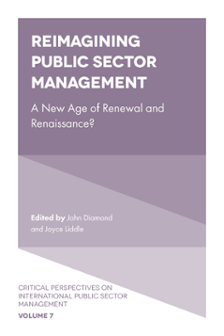
Index
Reimagining Public Sector Management
ISBN: 978-1-80262-022-1, eISBN: 978-1-80262-021-4
ISSN: 2045-7944
Publication date: 18 November 2022
Citation
(2022), "Index", Diamond, J. and Liddle, J. (Ed.) Reimagining Public Sector Management (Critical Perspectives on International Public Sector Management, Vol. 7), Emerald Publishing Limited, Leeds, pp. 185-191. https://doi.org/10.1108/S2045-794420220000007015
Publisher
:Emerald Publishing Limited
Copyright © 2023 John Diamond and Joyce Liddle. Published under exclusive licence by Emerald Publishing Limited
INDEX
- Prelims
- Introduction
- Theme 1 Context Setting and Overarching Questions
- Reflections on Public Administration and Management in a Post-NPM, Post-COVID-19 and Post-Wilsonian World
- Enhancing Collaboration
- Theme 2 New Forms of Localism and Community Wealth Building
- A Stronger Public Sector? The New Public Enterprise
- ‘Community Wealth Building’ and ‘Clever Tendering’ for an Inclusive Local Economy
- Post-Pandemic Renewal Has to Be Reimagined in Radical Ways: Making the Case for New Municipalism in Liverpool City Region
- Theme 3 Cross-Cutting Questions for a Reimagined Public Sector
- Understanding Renewed Public Service Ethos (PSE) in Public Management: Policy, Purpose and Pedagogy
- Fostering Resilience in the Public Sector – Implications for Public Service Motivation
- Using Open Government Data for Teaching Data Analytics in Public Sector Management
- Theme 4 Service Reforms and the Concept of Risk
- Re-imagining Ambulance Services Through Participation and Deliberation
- Vulnerability and Risk – Policing Paradox
- Conclusion
- Index